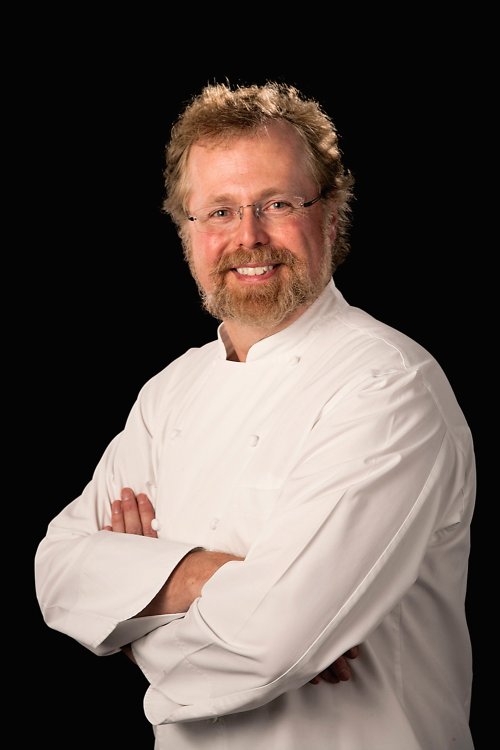LOS ANGELES (AFP) ― A U.S. mathematician who used to work for Microsoft is hoping to win over Gallic gastronomes, as he takes his “modernist” cooking methods to the home of traditional gourmet cuisine.
Defying critics who he argues view cooking “like religion,” chef Nathan Myhrvold is about to publish a French ― and German and Spanish ― version of his “Modernist Cuisine,” which mixes molecular science with the culinary arts.
The huge five-volume, 2,440 page tome, published in the United States and Britain earlier this year, also has a hefty price tag at 399 euros ($540), but Myhrvold says he hopes his ideas will win over new fans across the Atlantic.
He even likens conservative reaction to modernist methods ― whose exponents include Heston Blumenthal in Britain and Spanish masterchef Ferran Adria ― to the reception Nouvelle Cuisine initially received.
Defying critics who he argues view cooking “like religion,” chef Nathan Myhrvold is about to publish a French ― and German and Spanish ― version of his “Modernist Cuisine,” which mixes molecular science with the culinary arts.
The huge five-volume, 2,440 page tome, published in the United States and Britain earlier this year, also has a hefty price tag at 399 euros ($540), but Myhrvold says he hopes his ideas will win over new fans across the Atlantic.
He even likens conservative reaction to modernist methods ― whose exponents include Heston Blumenthal in Britain and Spanish masterchef Ferran Adria ― to the reception Nouvelle Cuisine initially received.

“Most really good cooks anywhere in the world in the 90s cooked in a style which was a combination of Escoffier and Nouvelle Cuisine,” he said, referring to renowned Gallic master Auguste Escoffier.
“It was primarily a French technique. France was the home of all the high-end technique. And these techniques had been around for a long time ― for 20 years at that time,” he said.
But Myhrvold, who quit his job as technical director at U.S. computer giant Microsoft in 1999, to found a scientific patent company, said he was in a good position to challenge that.
“That’s one of the reason I retired from Microsoft: I wanted more time to cook. And I had been aware for several years of the modernist approach in cooking,” he said by telephone from his home in Seattle.
“My background in science and in cooking together would put me in a very good position to write a book that would explain these new techniques to chef and anybody interested in food,” he added.
Myhrvold was never a professional chef himself, but he spent two years as an intern at Rover’s, a restaurant in Seattle run by French chef Thierry Rotureau, before training at the Ecole de la Varenne, in Burgundy.
It was only after that that he founded a culinary laboratory, where he embarked on all sorts of experiments with all sorts of ingredient, which he then shared with the wider gastronomic world.
His experiments blew some lazy habits out of the water: for example the traditional French dish confit de canard.
“There is a classic French technique for the confit de canard. Almost any chef you talk to will tell you that when you cook it in fat very slowly for a long period of time ... it produces this unique texture and flavor.
”We did a test by cooking it traditionally, but we also steamed it at the same temperature and for the same amount of time, and it’s the same. The oil, actually, doesn’t matter at all.
“When I tell some chefs that, they are almost angry at me,” he said.
The 52-year-old says gastrophiles who question the place of science in the kitchen need to learn from the past.
“People believe very strongly about food. It’s almost like religion. There is a very strong ideology about it. If we look back and look at the Nouvelle cuisine, the ideas were very simple,” he said.
“They stopped putting flour in sauces, for example. But at the time, it was a radical thing. Some food lovers totally denounced Nouvelle Cuisine, some championed it, there was huge controversy.
-
Articles by Korea Herald








![[Robert J. Fouser] Social attitudes toward language proficiency](http://res.heraldm.com/phpwas/restmb_idxmake.php?idx=644&simg=/content/image/2024/05/16/20240516050799_0.jpg&u=)

![[Graphic News] How much do Korean adults read?](http://res.heraldm.com/phpwas/restmb_idxmake.php?idx=644&simg=/content/image/2024/05/16/20240516050803_0.gif&u=)







![[Herald Interview] Byun Yo-han's 'unlikable' character is result of calculated acting](http://res.heraldm.com/phpwas/restmb_idxmake.php?idx=652&simg=/content/image/2024/05/16/20240516050855_0.jpg&u=)
